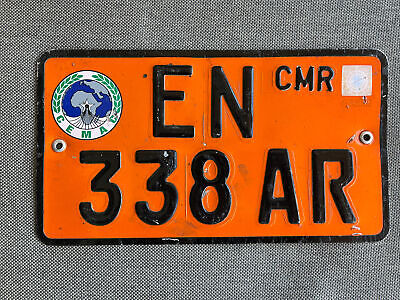In Cameroon, all motor vehicles, including cars, motorcycles, trucks, and buses, must be registered with the Ministry of Transport.
Upon registration, the vehicle owner is issued a unique number plate that must be displayed at the front and rear of the vehicle.
The format of vehicle registration plates in Cameroon typically consists of a combination of numbers and letters.
The numbers indicate the registration sequence, while the letters often provide additional information about the vehicle’s type or region of registration.
The plates also come in different colors, each signifying a specific category of vehicle use.
The system is designed to help regulate traffic, facilitate law enforcement, and ensure that vehicles operating on Cameroonian roads meet legal requirements.
Types of Vehicle Registration Plates and Their Meanings
Each type of vehicle in Cameroon has a specific registration plate color and format that signifies its function.
Below are the main categories of registration plates and what they represent:
1. Private Vehicles (White Plates with Black Lettering)
Private vehicles, including personal cars and motorcycles used for non-commercial purposes, have white license plates with black lettering.
These plates indicate that the vehicle is not used for business activities such as passenger transport or goods delivery.

Most vehicles on Cameroonian roads fall under this category, and owners must ensure their registration is up-to-date to avoid fines or impoundment.
2. Commercial Vehicles (Yellow Plates with Black Lettering)
Vehicles used for commercial purposes, such as taxis, buses, and trucks transporting goods, have yellow license plates with black lettering.
These plates differentiate business-use vehicles from private ones, making it easier for authorities to regulate commercial transport services.

Taxi drivers, bus operators, and logistics companies must ensure their vehicles are registered under this category to comply with transport laws.
3. Government Vehicles (Blue Plates with White Lettering)
Vehicles owned and used by the Cameroonian government have blue license plates with white lettering.
These plates are assigned to ministries, public offices, and government officials for official use.
Government vehicles are typically used for administrative purposes, public service operations, and national projects.
Misuse of government-registered vehicles for personal use can lead to disciplinary action or legal consequences.
4. Diplomatic Vehicles (Green Plates with White Lettering)
Vehicles belonging to foreign embassies, diplomatic personnel, or international organizations operating in Cameroon are assigned green plates with white lettering.
These vehicles enjoy certain legal protections under international diplomatic agreements.
However, they must still adhere to local traffic laws and regulations.
5. Military and Security Vehicles (Black Plates with White Lettering)
The Cameroonian Armed Forces, police, and other security agencies use vehicles with black license plates and white lettering.
These vehicles are often used for official defense and security operations.
Due to their official use, these vehicles are subject to strict regulations regarding ownership and operation.
Unauthorized use of military plates is considered illegal and can lead to severe penalties.
6. Temporary and Transit Vehicles (Red Plates with White Lettering)
Newly imported vehicles that have not yet been fully registered are issued red plates with white lettering.
These temporary registration plates allow vehicle owners to legally drive their cars while completing the registration process.
Vehicles in transit, such as those being transported to another country, also use these plates.
Once the vehicle reaches its final destination, it must be registered with the appropriate local authorities.
7. Test and Garage Plates (Red Plates with Black Lettering)
Vehicles undergoing mechanical tests or repairs in garages are given red plates with black lettering.
These plates allow mechanics and car dealers to test-drive vehicles before they are fully registered.
This category of registration is crucial for the automotive industry, ensuring that vehicles are roadworthy before they are sold or officially put into use.
8. Special and Custom Plates
Some vehicles, particularly those used by high-ranking officials or specific organizations, may have customized license plates with unique letter and number combinations.
These plates are issued under special government regulations and are not available to the general public.
How to Obtain a Vehicle Registration Plate in Cameroon
Registering a vehicle and obtaining a license plate in Cameroon involves several steps.
Whether you are registering a private car, a commercial vehicle, or an imported automobile, the process generally follows these key steps:
1. Gather the Required Documents
Before applying for a registration plate, vehicle owners must prepare the necessary documents, which typically include:
- Proof of vehicle purchase (sales receipt or invoice)
- Customs clearance certificate (for imported vehicles)
- Valid national identity card or passport of the owner
- Proof of residence
- Insurance certificate
- Roadworthiness certificate (if required)
2. Visit the Ministry of Transport or Delegated Office
The next step is to submit the documents to the Ministry of Transport or an authorized licensing office.
The application will be reviewed to ensure all requirements are met.
3. Pay the Necessary Fees
Vehicle registration fees vary depending on the type of vehicle and its intended use.
Payment must be made at designated government offices or authorized banks.
4. Receive the License Plate
Once the registration process is complete, the owner will be issued a license plate along with a registration certificate.
The plate must be properly attached to the front and rear of the vehicle.
Importance of Proper Vehicle Registration
Having a valid and correctly displayed vehicle registration plate is essential for:
- Legal Compliance – Driving an unregistered vehicle is illegal and can result in fines, vehicle impoundment, or other penalties.
- Traffic Regulation – Proper registration helps authorities track vehicles, enforce traffic laws, and ensure road safety.
- Ownership Identification – Vehicle registration links the car to its legal owner, making it easier to resolve disputes in case of theft or accidents.
- Insurance and Road Safety – A registered vehicle is eligible for insurance coverage, which is crucial in case of accidents or damages.




